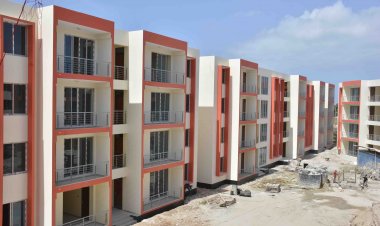Innovative Financing Models for Real Estate Development Projects in Africa
Innovative financing models are reshaping the real estate development landscape in Africa by providing developers with new avenues to secure funding for their projects.

Real estate development projects in Africa often face challenges when it comes to securing financing. Traditional funding sources may be limited or inaccessible, leading developers to explore alternative financing models to bring their projects to fruition. In recent years, innovative financing models have emerged as viable solutions to address the funding gap in the real estate sector across the continent.
One such model is crowdfunding, which has gained popularity as a way to pool resources from multiple investors to fund real estate projects. Crowdfunding platforms allow developers to showcase their projects to a wide audience of potential investors, who can contribute varying amounts of capital to the project. This democratized approach to financing not only provides developers with access to a diverse pool of investors but also allows individual investors to participate in real estate projects that were previously out of reach.
Listen to the latest episode of the African Real Estate Podcast here: https://spotifyanchor-web.app.link/e/JhXC6KFViIb
Some of the advantages and disadvantages of crowdfunding for investors and developers may include:
Advantages:
1. Access to capital
Crowdfunding allows real estate developers to access a larger pool of potential investors, including retail investors, who may not have had access to traditional real estate investment opportunities. This can help developers raise capital more quickly and efficiently.
2. Diversification
Crowdfunding enables investors to diversify their real estate portfolios by investing in multiple projects with varying risk profiles. This can help mitigate risk and potentially increase returns by spreading investments across different properties and markets.
3. Transparency
Crowdfunding platforms typically provide detailed information about the investment opportunity, including project details, financial projections, and potential risks. This transparency can help investors make informed decisions and understand the potential returns and risks associated with the investment.
4. Lower barrier to entry
Crowdfunding allows investors to participate in real estate projects with lower minimum investment amounts compared to traditional real estate investments. This lower barrier to entry can attract a wider range of investors, including those with limited capital.
Disadvantages:
1. Regulatory challenges
Crowdfunding for real estate is subject to regulatory oversight, which can vary by jurisdiction. Compliance with regulations can be complex and time-consuming, requiring developers to navigate legal requirements and ensure compliance with securities laws.
2. Lack of control
Investors in crowdfunding projects typically have limited control over the management and decision-making processes of the real estate project. This lack of control can be a disadvantage for investors who prefer a more hands-on approach to real estate investing.
3. Risk of fraud
Crowdfunding platforms may be susceptible to fraudulent activities, including misrepresentation of investment opportunities or misuse of investor funds. Investors should conduct thorough due diligence on crowdfunding platforms and projects to mitigate the risk of fraud.
4. Liquidity constraints
Real estate investments through crowdfunding are typically illiquid, meaning investors may have limited ability to sell their investment before the project reaches maturity. This lack of liquidity can be a disadvantage for investors, who may need to access their funds quickly.
Another innovative financing model gaining traction in Africa is impact investing. Impact investors seek to generate both financial returns and positive social or environmental impacts through their investments. In the real estate sector, impact investors may provide funding for projects that address affordable housing, sustainable development, or community revitalization. By aligning financial goals with social impact, impact investing offers a unique opportunity to support real estate development projects that benefit both investors and local communities.
The advantages and disadvantages of impact investing as a financing model for real estate include:
1. Social and environmental impact
Impact investing in real estate allows investors to support projects that have a positive impact on society and the environment. This can include affordable housing developments, sustainable building practices, and community revitalization initiatives.
2. Diversification
Impact investing provides investors with an opportunity to diversify their portfolios by allocating funds to projects that align with their values and goals. This can help reduce risk and potentially enhance long-term returns.
3. Access to new markets
Impact investing in real estate opens up opportunities to invest in emerging markets and underserved communities where traditional financing may be limited. This can lead to higher returns and a broader range of investment options.
4. Brand reputation
Engaging in impact investing can enhance the reputation of real estate developers and investors by demonstrating a commitment to social responsibility and sustainability. This can attract socially conscious investors and customers.
Disadvantages:
1. Financial returns
Impact investing in real estate may not always generate the same level of financial returns as traditional investment models. Projects focused on social or environmental impact may have lower profitability compared to purely profit-driven ventures.
2. Risk factors
Impact investing in real estate can be riskier than traditional investments due to the complexity of social and environmental factors involved. Regulatory changes, community opposition, and unforeseen challenges can impact the success of impact projects.
3. Measurement and reporting
Evaluating the social and environmental impact of real estate projects can be challenging, as there may not be standardized metrics or reporting frameworks in place. This can make it difficult for investors to assess the effectiveness of their investments.
4. Limited market awareness
Despite the growing interest in impact investing, there may still be a lack of awareness and understanding among investors and stakeholders about the benefits and risks associated with this financing model. This can hinder the growth of investment in real estate.
Furthermore, public-private partnerships (PPPs) have emerged as a successful financing model for real estate development projects in Africa. By leveraging the resources and expertise of both the public and private sectors, PPPs can help overcome funding constraints and accelerate the development of critical infrastructure and housing projects. Governments can provide land, regulatory support, and incentives, while private developers bring financing, construction expertise, and market knowledge to the table. This collaborative approach not only facilitates project financing but also promotes sustainable development and economic growth.
In conclusion, innovative financing models are reshaping the real estate development landscape in Africa by providing developers with new avenues to secure funding for their projects. Crowdfunding, impact investing, and public-private partnerships offer creative solutions to the funding challenges faced by developers, enabling them to unlock the potential of the continent's real estate market. By embracing these innovative models and fostering collaboration between stakeholders, Africa can harness the power of finance to drive inclusive and sustainable real estate development across the continent.
If you have a real estate press release or any other information that you would like featured on the African Real Estate Blog Post, do reach out to us via email at [email protected]

 AREBP
AREBP 






























![7 Famous Architectures in Africa [PHOTOS]](https://realestateblogpost.com/uploads/images/2023/05/image_380x226_646c9c2bd8642.jpg)